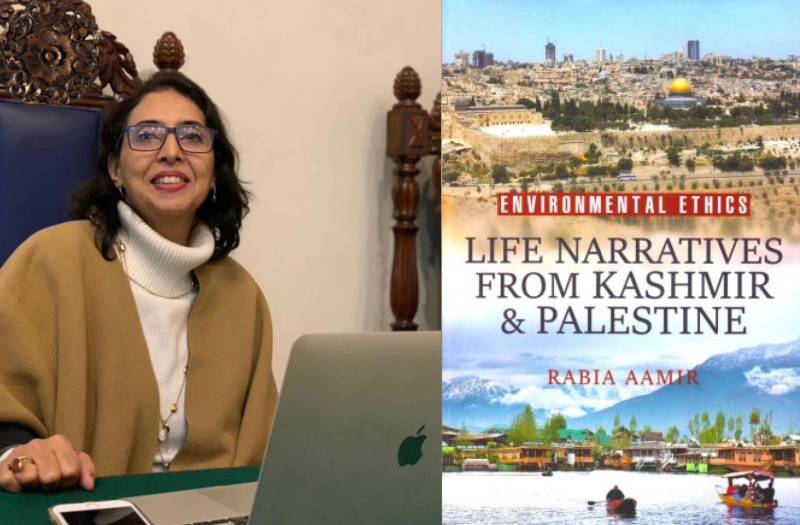
In the autumn of 2016, Rabia Aamir, an English language academic at the National University of Modern Languages in Islamabad, embarked on a groundbreaking project that would transcend the boundaries of traditional academic inquiry. Little did she know that her pursuit of knowledge would evolve into a profound exploration encapsulated in a 456-page masterpiece titled “Environmental Ethics: Life Narratives from Kashmir and Palestine.”
Aamir's work, published by Vanguard Books last year, not only adds 'individual talent' to academic writing but, more significantly, offers a unique and crucial perspective on the entrenched conflicts in these two global flashpoints.
Aamir's choice of literary works on Kashmir and Palestine serve as a poignant entry point into the lives of individuals navigating the complexities of conflict and environmental degradation. The narratives within Curfewed Night by Basharat Peer immerse the reader in the complexities of Kashmir, offering his firsthand account of life, love, and war. Meanwhile, Return provides a poignant exploration of Ghada Karmi's personal journey as a Palestinian, shedding light on the profound consequences of displacement and conflict.
These memoirs, chosen as core texts, serve as more than literary sources; they are windows into the multifaceted relationships between environmental challenges, personal narratives, and the enduring impact of colonial histories.
The focus on interpellative strategies within these narratives is paramount in comprehending how dominant ideologies shape the subjectivities of the people in these regions. These interpellative strategies act as a bridge between seemingly disparate issues, connecting the shaping of individual subjectivities to broader environmental and geopolitical challenges.
As we delve into the contents of Aamir's book, it becomes evident that she consciously chose environmental ethics as a theoretical framework to unravel the complexities of Kashmir and Palestine. Beyond geopolitical analyses, she weaves a narrative that explores the ethical dimensions of the environments in these troubled regions, shedding light on the intertwined relationship between human actions, narratives, and the ecosystems they inhabit.
The study begins by introducing the term "idées reçues," or received ideas, challenging the normative narratives surrounding Kashmir and Palestine. By employing environmental ethics as a guiding theoretical framework, Aamir invites readers to question not just political dogmas, but also the ethical implications of human interventions in these contested landscapes.
Environmental ethics, as a discipline, delves into the moral considerations underlying human interactions with the environment. In the context of Kashmir and Palestine, where political tensions have often eclipsed environmental concerns, Aamir's choice of this theoretical lens becomes a profound strategy to unearth the deeper layers of the conflicts.
Kashmir and Palestine, both characterized by their strategic importance and contested political statuses, have inspired a plethora of literary and visual narratives. Aamir meticulously analyzes memoirs from these regions, framing the discussion within the ethical dimensions of environmentalism. This move extends the conversation beyond the immediate political strife, offering a more holistic understanding of the challenges faced by the people in these flashpoints.
The selected texts in Aamir's study serve as windows into the compromised local agency of indigenous spaces. Through the lens of environmental ethics, she explores how these narratives depict issues of marginalization and erasure. This approach not only broadens the scope of contemporary knowledge in the field but also challenges the conventional wisdom that tends to sideline environmental concerns in the face of geopolitical turmoil.
One of the central arguments of Aamir's monograph pivots around an inquiry into how these narratives illuminate a compromised local agency and phrase the issues of marginalization and erasure. Environmental ethics, as the theoretical underpinning the narratives, becomes the compass guiding readers through the ethical landscapes of Kashmir and Palestine, transcending mere political analysis.
The memoirs selected for study subvert official accounts and challenge received ideas about Kashmir and Palestine. By weaving the interpellative strategies of neo/settler colonialisms into the narratives, the authors not only disrupt normative narratives, but also draw attention to the environmental ethics of their respective homelands.
Aamir's exploration of neocolonialism and settler-colonialism as potential fuels for environmentalism in Kashmir and Palestine is particularly enlightening. By linking these concepts with environmental ethics, she unearths the amnesiac relationship these ideologies have with the wars of dispossession. The study questions whether the very forces that have fuelled conflict may also be shaping environmental attitudes in these regions.
The book serves as a bridge between the realms of academia and activism, encouraging readers to consider the ethical implications of environmental degradation in conflict zones. It challenges the dichotomy often drawn between environmentalism and political turmoil, urging a more nuanced understanding that sees these issues as interconnected.
Aamir's work, though primarily focused on Kashmir and Palestine, transcends geographical boundaries. By addressing troubled realms worldwide, it becomes a relevant conversation for students of environmentalism, environmental ethics, spatial justice, and spatiality. The theoretical framework of environmental ethics, woven intricately into the fabric of Aamir's study, provides a roadmap for understanding and addressing environmental challenges in conflict-ridden areas globally.
In essence, Aamir's monograph transcends the realm of scholarly exploration; it stands as a significant contribution to the discourse on decolonization. Serving as a beacon of hope in the midst of conflict, the book employs environmental ethics as a unique perspective, providing a pathway for individuals ensnared in the vicious cycle of violence. Notably, it introduces a postcolonial dimension to the ongoing debates on environmental ethics, offering insights that reach beyond traditional geopolitical analyses.

